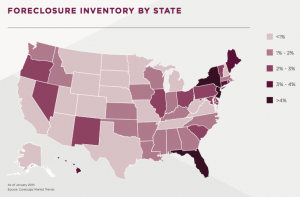From the NY Times:
Homeowners who refinanced when fixed mortgage rates dropped below 4 percent will be less inclined to put their homes on the market as interest rates climb. And as a result, the limited property supply already impeding sales in many markets may not ease anytime soon.
A recent survey by Redfin, a national real estate brokerage based in Seattle, suggests that even those beneficiaries of low-refinance rates who do decide to move may want to make money renting out their homes while waiting for prices to rise, rather than sell right away.
Redfin questioned 1,900 people nationwide who said they planned to buy a home within a year; 42 percent said they already owned one, and of those, 39 percent said they planned to rent it out after they moved. The survey also asked buyers about their frustrations with the process, and “low inventory” topped the list.
…
“These are the folks that will think twice before they pay off that mortgage that is such cheap money,” he said. “They’re going to explore all types of options before they do that.”
…
But he views another scenario as more likely for low-rate holders: Those who can’t afford to move on without selling will essentially be “locked into” their homes. As interest rates rise, even buying another home at the same price will result in a higher mortgage payment.In a recent analysis of the effect of lock-ins, Mr. Hendershott predicted that if rates continue to rise, the result will be substantial declines in housing turnover in strong housing markets, in which large numbers of households refinanced at low rates.
“We had a big episode of this in the 1980s,” he said, recalling when soaring interest rates locked in large numbers of homeowners.
Research cited in his analysis found that during that period, household mobility declined by 15 percent for every 2 percent increase in rates.

